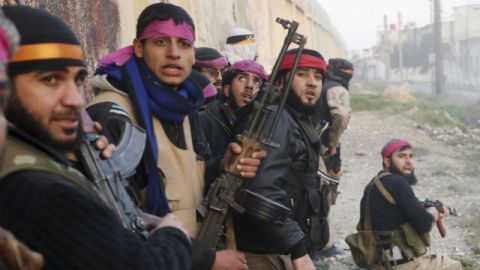When Should the United States Intervene Abroad?

I won’t propose an answer to this hugely complex question today. Instead, I want to point out some striking similarities between the American perspective on the conflict in Chechnya a decade ago and the run-up to the Obama administration’s pending decision on how to handle the Assad regime’s apparent use of chemical weapons in Syria’s horrible civil war. Using chemical weapons, the president has said repeatedly, is a “red line” that would trigger a U.S. reaction.
A representative from U.S. State Department wrote about U.S. policy considerations in Chechnya in 2002. Substitute “Syrian rebels” for “Chechnyans,” “Syria” for “Russia” and a few other local details, and you have a pretty good sense of how the United States has handled Syria’s nightmarish civil war over the past two years:
As you all know, the current conflict in Chechnya in a few months will begin its third year. Coming on the heels of the first conflict in Chechnya from 1994-1996, this latest conflict has dragged on nearly twice as long but with a similarly tragic price in human lives, people’s homes, and Chechen society. The casualties mount every day — for both sides, Chechen and Russian alike — and the pain and suffering of innocent civilians resulting from the fighting see no end in sight. There are few places in the world that have borne such devastation as Chechnya. Continuation of the conflict not only constitutes a drain on Russian development and a living nightmare for innocent Chechens, but it poses a threat to the entire Caucasus region.
Sadly, this tragic situation shows no signs of ending soon. The fighting goes on. Russian forces conduct sweeps, sealing towns and villages and searching house to house for fighters. Often these sweeps are subsequently followed by reports of the beatings and torture of civilians, of extortion, or the disappearances of young men. Russian convoys are ambushed daily by Chechen fighters using landmines, and Russian blockposts or administrative buildings are often attacked in hit-and-run raids. Pro-Moscow Chechen administrators are assassinated. The economy is in shambles. Housing and infrastructure are destroyed, especially in Grozny where thousands still live, struggling from day to day in the most difficult conditions.
The United States Government is committed to doing all that we can to bring about an end to this conflict and to relieve the suffering of the civilian population. Through our humanitarian assistance programs and our diplomatic efforts, the United States remains engaged on Chechnya.
Our objectives for Chechnya today are the same as they have been in the past. We seek a political settlement that will end the fighting, promote reconciliation, and recognize the territorial integrity of the Russian Federation. We also seek accountability for human rights abuses committed by all sides, and unimpeded access to the displaced by humanitarian organizations. As we have always done, we are working toward these objectives in our on-going discussions with the Russian Government, in concert with our friends and allies, and in partnership with international and non-governmental organizations.
These expressions of noncommittal concern sound a lot like the modus operandi of the American government over the past 24 months with regard to Syria, with one clear difference: the U.S. issued no specific ultimatums to Russia about its treatment of the Chechen population. President Obama has done just that, putting the American president into a tight spot now that the Israelis and Americans are citing evidence that chemical weapons may have been used. How Obama will respond is an open question, with several problematic options: the Americans do not want to appear weak or irresolute, especially in light of Iran’s nuclear ambitions; nor do they want to start another war in the Middle East.





